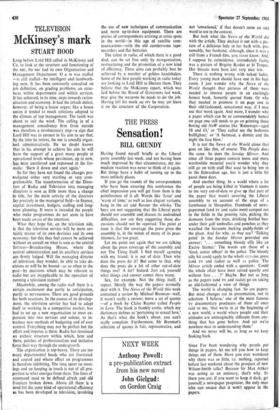Sensation!
THE PRESS BILL GRUNDY
Having found myself briefly at the Liberal party assembly last week, and not having been much improved by that circumstance, my im- mediate reaction was never to think of it again. But things have a habit of turning up in the most unlikely places.
If you go the rounds of the correspondents who have been covering this conference the .chief impression you will get from them is the pointlessness of it all. Words like `farce' and `waste of time,' as well as less elegant variants, hang in the air and flavour the whisky. The boys are not suggesting that the Liberal party should not assemble and discuss its undoubted difficulties, nor are they suggesting those dis- cussions should not be reported. The point at issue is that the coverage the press gives -the assembly is, in the minds of many of its prac- titioners, far too great.
Let me point out again that we are talking about tle press coverage of the assembly and not The Thing Itself. I find myself agreeing with my friend; it is out of date. Then why does the press do. it? But come to that, why does the press do a lot of other out-of-date things too? A lot? Indeed. Just ask yourself what things and answer comes there many.
Sex, for example. Not the thing itself, I repeat. Merely the way the papers normally deal with it. The News of the World this week contained a review by Michael Brennan—well, it wasn't really a review; more a set of quotes —of a book by Claire Rayner called People in Love. The book is frankly erotic, which my dictionary defines as 'pertaining to sexual love.' As that's what the book's about, you can't really complain. Furthermore, Mr Brennan's selection of quotes is fair, representative, and not 'sensational,' if that doesn't seem an odd word to use in the context.
But look what the News of the World did with the article. They decked it out with a pic- ture of a delicious lady in her bath with, pre- sumably, her husband, although, since it was a still from a French film, you never know. And, I suppose by coincidence, immediately facing was a picture of Brigitte Bardot at St Tropez. Her breasts were bare and very nice too.
There is nothing wrong with naked ladies. Every young man should have one in his bed- room. I just wonder why the News of the World thought that pictures of them were needed to interest people in an excitingly honest book, honestly quoted from. Or why they needed to promote it on page one in their old-fashioned, sensational way, if I may use that word again. And more, I wonder why a paper which can be so commendably honest on page one still needs to go on printing those boring old NoW stories like `Runaways—aged 18 and 63,' or 'They called me the bedroom bullfighter,' or 'A barmaid, a dentist and the night the fuse blew.'
It is not the News of-the World alone that goes on like this, of course. The People does the same. So does the Sunday Mirror. And since all three papers contain more and more worthwhile material you'd wonder why they still go on with stuff that used to bring 'em in in the Edwardian age, but is just a little bit passé these days.
And another thing. In a world where a lot of people are being killed in Vietnam it seems to me very out-of-date to give up that part of the paper that wasn't covering the Liberal assembly to an account of the siege of a farmhouse in Shropshire. Hundreds of news- papermen (and Tv and radio men) camped out in the fields in the pouring rain, picking the damsons from the trees, drinking bottled beer under their golf umbrellas and ponchos as they watched the Saracens making paddy-fields - of the place. And for why, as they say? `ralking point' in the Sunday Mirror provided one
answer: . . something bloody' silly like an Excise licence.' The words are those of a `tired, senior officer' in the police. The bloody silly bit could apply to the whole exercise; press (and TV and radio) well as police. The Mirror article ended with a question : 'Could the whole affair have been solved quietly and without fuss . . ?' Maybe. But not as long as the papers (and Tv and radio) go on taking so old-fashioned a view of things.
The world is changing fast. So are papers. But most changes are in presentation, not in selection. 'I believe,' one of the most famous TV documentary producers of them all once said to me, 'that we're in at the beginning of a new world,- a world where people and their attitudes are unimaginably different from any- thing that has gone before. And yet we're nowhere near to understanding them.'
And we never will be, as long as we keep looking back.
Since I've been wondering why people ,put things in papers, let me tell you how to keep things out of them. Have you ever wondered why there was so little, i.e. nothing, reported before last weekend about the prospect of new Wilson-Smith talks? Because Sir Max Aitken was acting as an emissary, that's why. So there you are; if you want to keep it dark, get yourselLa newspaper proprietor, the only man who can ensure that it writ% appear in the papers.










































 Previous page
Previous page